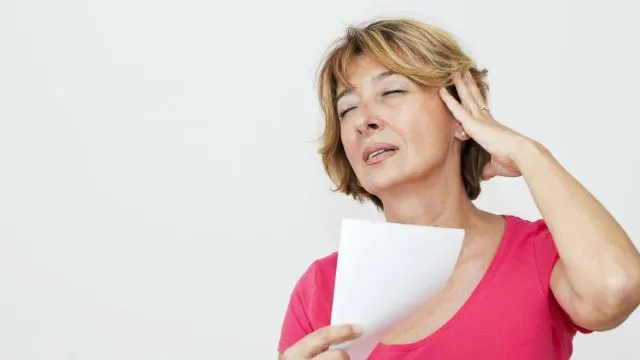
- Share on Facebook68
- Share on Pinterest
- Share on Twitter
Hot flashes are one of the most universal – and most annoying – symptoms of menopause. These instantaneous spikes in temperature can either be focused in one area, or felt throughout the body. In some cases, they are accompanied by sweating, flushing, shivers or red blotches on the skin.
Experiencing hot flashes can be embarrassing, and add to the already significant stresses surrounding menopause. However, instead of opting for hormone replacement therapy, which has been linked to dangerous side effects, including a higher risk of heart disease, stroke and certain cancers, try the following natural remedies to help you keep cool.
A cooling, plant-based diet
Basing your diet around fresh, organic fruits and vegetables, as well as legumes and nuts, may help to mitigate hot flashes. Eating your fruits and veggies raw can be especially beneficial, as many have a cooling effect on the body. Nuts and legumes contain phytoestrogens, which may help to provide some balance to your hormones.
Try to avoid alcohol, caffeine, spicy foods and chocolate (we’re sorry), as these have been found by some women to trigger hot flashes. Staying away from sugar is a must as well, as it is strongly linked to inflammation. As always, make sure you keep well-hydrated by drinking at least eight glasses of water each day.
Maca root and black cohosh
 While there is not a great deal of research on these two herbs in relation to menopause, they are both used traditionally to balance hormones and reduce menopausal symptoms. Maca root has also been found to increase energy, which may help to fight some of the fatigue you may be feeling.
While there is not a great deal of research on these two herbs in relation to menopause, they are both used traditionally to balance hormones and reduce menopausal symptoms. Maca root has also been found to increase energy, which may help to fight some of the fatigue you may be feeling.
To better understand how you can incorporate maca root and black cohosh into your routine, and how much is best for your individual needs and body composition, talk to a naturopathic practitioner that you trust first.
Acupuncture
A recent study published in the journal Menopause analyzed a total of twelve studies, involving 869 women who were experiencing menopause. Researchers found that women who underwent acupuncture treatments experienced a reduction in the frequency and severity of hot flashes for up to three months, compared to women who did not get acupuncture.
Yoga
A study published earlier this year in the journal Climacteric found that yoga may be a way to help reduce certain symptoms of menopause. According to study author Nancy Woods of the University of Washington, “in particular, yoga showed significant treatment effects for hot flushes and cognitive symptoms.”
Woods and her colleagues also noted that mindfulness-based stress reduction techniques may help reduce hot flashes, as well.
-The Alternative Daily
Sources:
http://journals.lww.com/menopausejournal/Abstract/publishahead/Effects_of_acupuncture_on_menopause_related.98349.aspx
http://www.dailymail.co.uk/health/article-2570711/How-yoga-sessions-ease-symptoms-menopause-Stress-reduction-therapies-maybe-alternative-hormone-replacement-treatment.html
http://www.ncbi.nlm.nih.gov/pubmed/23937432
https://www.thealternativedaily.com/acupuncture-may-take-heat-hot-flashes
https://www.thealternativedaily.com/natural-ways-combat-change-life-symptoms
- Share on Facebook68
- Share on Pinterest
- Share on Twitter

